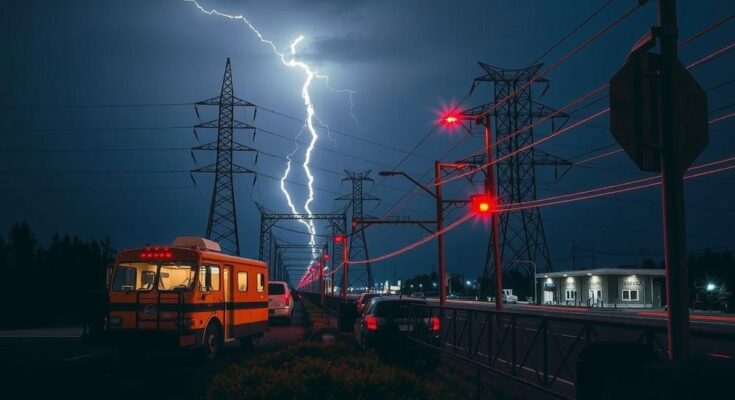The bomb cyclone in Western Washington recently caused power outages for approximately half a million individuals, revealing vulnerabilities in the electrical grid. Experts argue for urgent upgrades and improvements, emphasizing the need for increased renewable energy sources and better communication among utilities. The increasing frequency of severe weather events and their consequences necessitate immediate action to enhance the resilience of the power supply.
The recent bomb cyclone that struck Western Washington resulted in power outages affecting approximately half a million individuals, thereby underscoring significant vulnerabilities within the region’s electrical grid. The cyclone, characterized as a massive low-pressure system, generated hurricane-force winds that toppled trees and brought down power lines. The aftermath revealed extensive damage necessitating complex repairs, affecting homes, schools, hospitals, and businesses for prolonged periods.
Grid experts are urging immediate attention to necessary upgrades as utilities work towards transitioning from fossil fuels to renewable energy sources, adhering to state mandates for carbon neutrality by 2045. In addition to increasing power generation capacity, utilities face a glaring shortage of electricians to repair and maintain existing infrastructure. Growing electricity demands, coupled with the impacts of climate change on hydropower, illustrate an urgent need for more robust solutions, including enhanced renewable options and battery storage.
While meteorologists assert that this particular storm was not directly caused by climate change, they caution that future storms could be influenced by it, raising the risk of increased electricity demands that may exceed supply capabilities. These severe weather events are becoming more frequent and intense, highlighting systemic deficiencies.
The challenges observed during this outage included delays in response efforts. Communication breakdowns with Puget Sound Energy hampered coordination among emergency services and utilities, contributing to prolonged outages across the region. Hospitals and critical infrastructure faced difficulties obtaining timely information, exacerbating the crisis.
Utilities such as Seattle City Light faced operational hurdles, including workforce shortages, which hindered repair efforts. Initiatives aimed at enhancing grid resiliency are critical, including potential localized battery storage and microgrid systems to ensure that neighborhoods can maintain power independently during widespread outages.
Furthermore, as the energy landscape evolves, there is an argument for innovation from the private sector to drive meaningful changes in how utilities operate. The continued reliance on fossil fuels poses risks that could worsen future storms, necessitating a shift towards more sustainable energy practices. Strengthening the grid against outages and ensuring a resilient and reliable power supply are not only prudent but essential for the community’s future.
The article details an event in which a bomb cyclone caused extensive power outages in Western Washington, impacting hundreds of thousands of residents. It highlights the stress on the existing electrical grid, which struggles to meet rising demands amidst a transition toward renewable energy sources as mandated by state law. Experts emphasize the need for infrastructural upgrades and improved coordination among utilities to mitigate future vulnerabilities. Furthermore, it discusses the implications of climate change on such severe weather events and urges for innovative solutions to enhance grid resilience.
The bomb cyclone that recently impacted Western Washington has exposed critical weaknesses within the state’s electrical grid. Experts advocate for significant upgrades to meet rising electricity demands and improve the system’s resilience to future extreme weather events. Effective coordination among utilities is essential for timely response to outages, and innovative solutions, including localized power systems, must be pursued. The focus on transitioning to renewable energy sources while ensuring reliability is crucial for safeguarding the community against potential crises in the future.
Original Source: www.seattletimes.com




